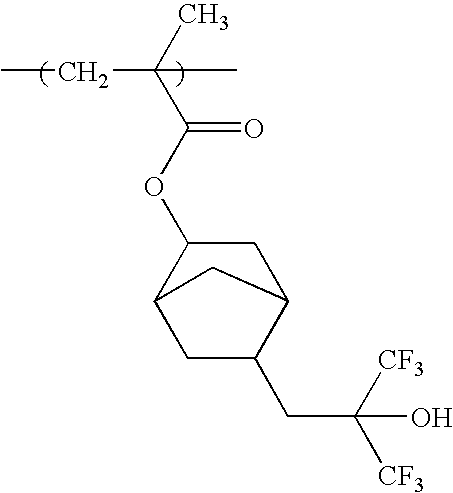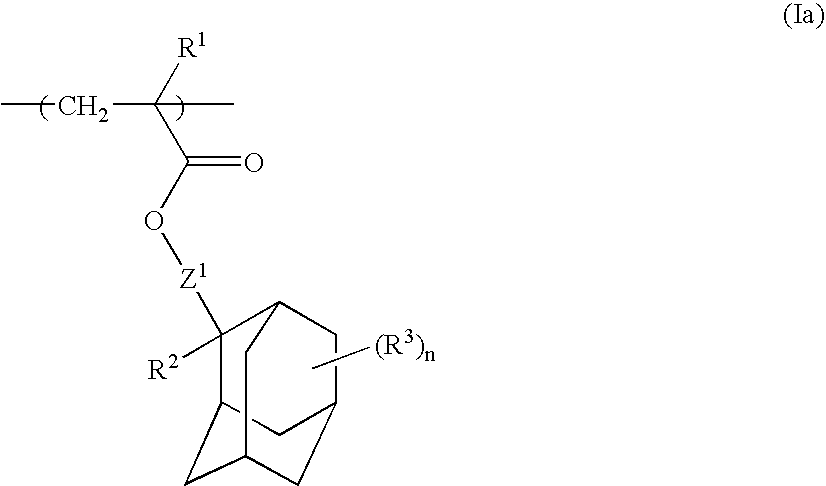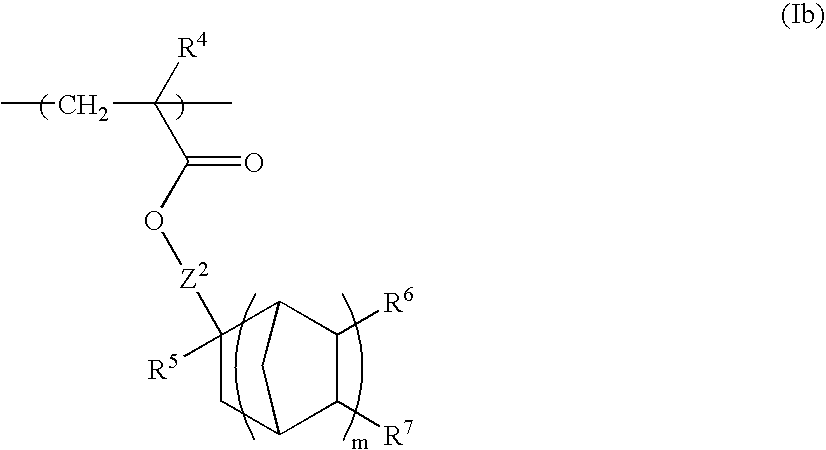Chemically amplified positive resist composition
a technology of positive resist and composition, applied in the direction of photosensitive materials, instruments, photomechanical equipment, etc., to achieve the effect of excellent various resist abilities, good pattern profile, and higher contact angl
- Summary
- Abstract
- Description
- Claims
- Application Information
AI Technical Summary
Benefits of technology
Problems solved by technology
Method used
Image
Examples
synthesis example 1
Resin Synthesis Example 1
Synthesis of Resin A1
[0240]30.00 parts of monomer A, 14.27 parts of monomer B, and 10.28 parts of monomer C were dissolved in 2.6 times amount of methyl isobutyl ketone as much as the amount of all monomers to be used (monomer ratio; monomer A: monomer B: monomer C=50:25:25). To the solution, 2,2′-azobisisobutyronitrile was added as an initiator in a ratio of 2 mol % based on all monomer molar amount, and the resultant mixture was heated at 87° C. for about 6 hours. The reaction solution was poured into large amount of a mixed solvent of methanol and water to cause precipitation. The precipitation was isolated and washed three times with large amount of a mixed solvent of methanol and water for purification. As a result, copolymer having a weight-average molecular weight of about 9,400 was obtained in a yield of 47%. This copolymer had the following structural units. This is called as resin A1.
[0241]
synthesis example 2
Resin Synthesis Example 2
Synthesis of Resin A2
[0242]23.00 parts of monomer A, 5.47 parts of monomer B, 7.88 parts of monomer C and 5.14 parts of monomer E were dissolved in 2.6 times amount of 1,4-dioxane as much as the amount of all monomers to be used (monomer ratio; monomer A: monomer B: monomer C: monomer E=50:12.5:25:12.5). To the solution, 2,2′-azobisisobutyronitrile was added as an initiator in a ratio of 3 mol % based on all monomer molar amount, and the resultant mixture was heated at 87° C. for about 5 hours. The reaction solution was poured into large amount of a mixed solvent of methanol and water to cause precipitation. The precipitation was isolated and washed three times with large amount of a mixed solvent of methanol and water for purification. As a result, copolymer having a weight-average molecular weight of about 8,200 was obtained in a yield of 58%. This copolymer had the following structural units. This is called as resin A2.
[0243]
synthesis example 3
Resin Synthesis Example 3
Synthesis of resin A3
[0244]13.50 parts of monomer A, 3.53 parts of monomer B, and 18.66 parts of monomer F were dissolved in 1.5 times amount of 1,4-dioxane as much as the amount of all monomers to be used (monomer ratio; monomer A: monomer B: monomer F=40:11:49). To the solution, 2,2′-azobisisobutyronitrile and 2,2′-azobis(2,4-dimethylvaleronitrile) were added as initiators in a ratio of 1 mol % and 3 mol % respectively based on all monomer molar amount, and the resultant mixture was heated at 74° C. for about 5 hours. The reaction solution was poured into large amount of a mixed solvent of methanol and water to cause precipitation. The precipitation was isolated and washed three times with large amount of a mixed solvent of methanol and water for purification. As a result, copolymer having a weight-average molecular weight of about 8,300 was obtained in a yield of 85%. This copolymer had the following structural units. This is called as resin A3.
[0245]
PUM
| Property | Measurement | Unit |
|---|---|---|
| temperature | aaaaa | aaaaa |
| temperature | aaaaa | aaaaa |
| temperature | aaaaa | aaaaa |
Abstract
Description
Claims
Application Information
 Login to View More
Login to View More - R&D
- Intellectual Property
- Life Sciences
- Materials
- Tech Scout
- Unparalleled Data Quality
- Higher Quality Content
- 60% Fewer Hallucinations
Browse by: Latest US Patents, China's latest patents, Technical Efficacy Thesaurus, Application Domain, Technology Topic, Popular Technical Reports.
© 2025 PatSnap. All rights reserved.Legal|Privacy policy|Modern Slavery Act Transparency Statement|Sitemap|About US| Contact US: help@patsnap.com



